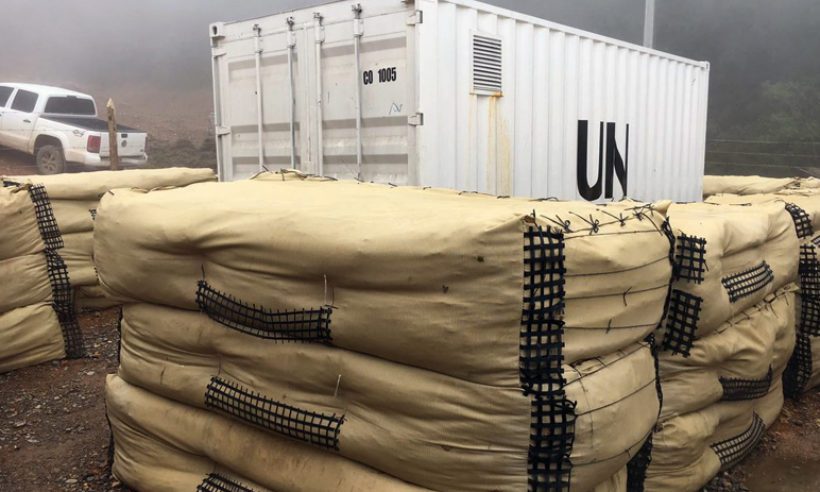Farewell to Arms: FARC Surrenders Weapons in Historic Step for Colombian Peace Process
The largest guerrilla group in Colombia, after more than a half-century of conflict, has now disarmed, the United Nations (UN) has verified. This was a major step forward in the nation’s historic peace accord that, despite some delays, will now move beyond demobilization and disarmament and into the phases focused on the justice process and reintegration of the former combatants into Colombian society.
Yesterday, after handing over the last of more than 7,000 weapons, the Revolutionary Armed Forces of Colombia (FARC) officially ceased to be an armed faction. Today, the group held a ceremony to commemorate the moment that a ceasefire backed by a signed document became the official end of an armed conflict that killed more than 260,000 and displaced more than seven million.
The event, held in former guerrilla stronghold territory in the department of Meta, featured addresses by both top FARC commander Rodrigo Londoño, aka, Timochenko, and Colombian President Juan Manuel Santos, who again reiterated that the controversial peace deal finalized last December is “irreversible.”
The United Nations has been the lead independent monitor for the FARC disarmament and has now stored away the 7,132 arms that were turned over. It has also removed or destroyed some of many weapons caches hidden throughout the country. The UN said it will continue to locate and deal with the hundreds of remaining caches, many of which are located deep in the jungle or otherwise inhospitable terrain, in hope of having “the highest percentage possible” accounted for by September 1.
“We consider that the commitment to lay down individual arms … has been honored,” said Jean Arnault, head of the UN Mission in Colombia, in a statement. Arnault added that 700 individual weapons still remain within the temporary FARC demobilization camps where the combatants have been staying for months. These arms will remain with members of the guerrilla group for security purposes, as agreed upon in the roadmap for demobilization, until August 1, according to the UN.
The global organization has also given certificates to the rank-and-file combatants that acknowledges their peaceful disarmament and affords them proof that they have disbanded from an illegally armed group.
The remaining FARC dissidents who opted not to participate in the peace process, which represent a small but not insignificant percentage of the estimated 7,000 FARC members, will now be treated as criminals by Colombian authorities and ineligible for the judicial benefits, including full amnesty in most cases, that those who handed over their weapons will receive.
Arnault stressed that, while transitioning from disarmament to the upcoming third phase of the peace process is a monumental step forward, there is still precarious road ahead. Domestic politics in the country mean that many, including influential former President Álvaro Uribe, want to see aspects of the deal changed.
Just last week, according to Colombia Reports, Uribe said that “the deals will not be eliminated, they will be modified” if his party prevails in next year’s elections in Colombia, which will see two-term President Santos leave office.
Amid this climate, Arnault said that the United Nations invites both the government and the FARC “to redouble their efforts so that the ceasefire and the laying down of weapons that we are celebrating today translate without delay into greater security for all.”
FARC members will now move toward the process of re-integrating into society. And the guerrilla group that has caused so much death and destruction for more than 50 years will eventually begin a transition into a political party that will attempt to effect change through campaigns and bills, not arms, said Santos.
“Today, June 27, for me, and I think for the vast majority of Colombians, is a very special day — a day that we will never forget: the day the weapons were changed for words,“ said President Santos from the town of Mesetas in Meta.
Speaking directly to FARC head Timochenko, the president said that he believes that the organization will continue to abide by the terms of the peace accord. “I take your word,” said Santos. “Colombia is taking your word, and the international community is the witness. Going forward, as you have said, this word will be your only weapon. This is the best news for Colombia in the last 50 years.”
In a UN statement verifying the surrender of arms, Arnault said that the organization’s oversight role has been “without precedent” in any other peace process it has participated in. He added that the United Nations will draw lessons from the experience of Colombia to apply in other parts of the world.
“In a world convulsed by old and new forms of violence, by conflicts whose protagonists appear irreconcilable, by unprecedented movements of refugees and displaced persons,” said Arnault, “a successful process of peace building in Colombia is also a reason for hope and a powerful example for the international community.”
Photo: The United Nations has received and stored weapons turned over during the FARC’s disarmament process in recent months, and it has now verified that the guerrilla group has complied with the terms of the peace agreement with Colombia. (Credit United Nations)

























